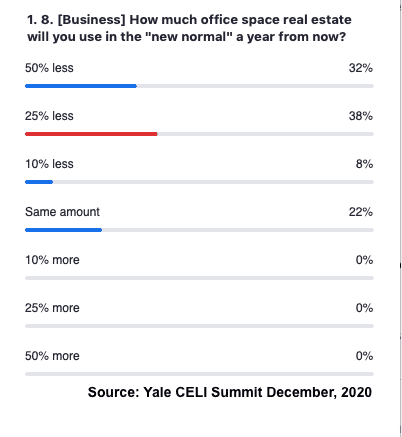 When it comes to vaccinating employees for Covid, should companies make it mandatory? That’s shaping up to be one of the most pressing, most controversial questions facing business leaders in 2021. At a gathering of big-company CEOs held virtually Tuesday, the answer appeared to be “yes” — with caveats.
When it comes to vaccinating employees for Covid, should companies make it mandatory? That’s shaping up to be one of the most pressing, most controversial questions facing business leaders in 2021. At a gathering of big-company CEOs held virtually Tuesday, the answer appeared to be “yes” — with caveats.
In a poll of more than 150 CEOs of America’s largest companies held Tuesday by The Yale Chief Executive Leadership Institute, 71% of those polled said they believed Covid vaccination should be required at work by companies.
In other polls taken of business leaders during the summit:
 88% said a Biden presidency would “improve U.S. standing in the world.”
88% said a Biden presidency would “improve U.S. standing in the world.”But underscoring how controversial a decision to mandate immunization might be in a country where even requiring masks has proven to be deeply polarizing, many of the CEOs who were asked directly if they would mandate vaccines—even for their most essential workers—said they had not yet formulated a plan to do so and would wait and see how the first wave of vaccinations went before deciding on a policy.
“We’re going to look at it closely, but it is too soon to make a decision,” Lynn Good, CEO of Duke Energy, said when asked about vaccines by Jeff Sonnenfeld, CEO of the Yale Chief Executive Leadership Institute and a longtime Chief Executive columnist. Other CEOs Sonnenfeld asked had similar responses.
“It’s too early to say,” Doug Parker, CEO of American Airlines, said when asked if he expected to mandate vaccines for either employees or passengers. “What we all think we need to do is let the vaccine be distributed, see what, indeed the acceptance rates are, and ground business decisions based on that. Certainly for airlines, there will be countries that I imagine will require vaccines in order for people to enter the country. So we’ll have to, as airlines, deal with it in that regard anyway.”
The discussion comes amid the first wave of inoculations using Pfizer’s newly-released Covid vaccine, as well as expected FDA approval of another vaccine from drugmaker Moderna this week. Both vaccines—which require two doses for maximum effectiveness—have been found to be more than 90 percent effective in clinical trials. But new polling continues to find worrisome numbers of Americans—around 40%—still say they will not or may not get vaccinated.
 So far, the rollout of Pfizer’s new vaccine in the U.K., Israel and the U.S. is going “very well,” said Albert Bourla, the company’s CEO, who attended the Yale Summit. “Obviously, when you are about to undertake such a monumental task to distribute a vaccine at the same time to hundreds of countries, over a period of time, it’s very, very difficult logistically,” he said. “When you add that this is medicine, that this will require special transportation conditions, particularly our vaccine, which requires low temperatures, of course that makes it very challenging…but we were preparing for this risk since April.”
So far, the rollout of Pfizer’s new vaccine in the U.K., Israel and the U.S. is going “very well,” said Albert Bourla, the company’s CEO, who attended the Yale Summit. “Obviously, when you are about to undertake such a monumental task to distribute a vaccine at the same time to hundreds of countries, over a period of time, it’s very, very difficult logistically,” he said. “When you add that this is medicine, that this will require special transportation conditions, particularly our vaccine, which requires low temperatures, of course that makes it very challenging…but we were preparing for this risk since April.”
The impact of Covid would have far-ranging effects beyond just human health, the CEOs in attendance said. Asked, for instance, how much the pandemic would impact their real-estate decisions in the year ahead, a stunning 85% of those polled thought they would need less space for their workforces—32% said they’d use 50% less office space a year from now, 38% said they’d use 25% less. No one polled said they planned to expand their office space in the coming year.
“There was already a trend before the pandemic of more remote work,” said Michael Dell, CEO of Dell Technologies. “The learned behaviors over the last 10 months have been pretty ingrained in terms of the efficiencies and the productivity of meetings like this. We’re sort of in this all-digital work-from-anywhere world and, you know, work is not a place, it’s something you do. And you can do it from anywhere.”
That could be a boon for business, and for the country, said Steve Case, the former CEO of AOL, who has worked for years to bring economic opportunity to areas outside of the nation’s traditional capitols of capital. “The innovation economy has really been limited to a few people in a few places,” he said. “I think over the next five or 10 years, we may see a dispersion of talent, more of a dispersion of capital and more of a dispersion of some of these big jobs, creating companies, not just in Silicon Valley, New York City, Boston, but all across the country. So hopefully that’s something that will be a positive coming out of this terrible pandemic.”

Chief Executive Group exists to improve the performance of U.S. CEOs, senior executives and public-company directors, helping you grow your companies, build your communities and strengthen society. Learn more at chiefexecutivegroup.com.
0

1:00 - 5:00 pm
Over 70% of Executives Surveyed Agree: Many Strategic Planning Efforts Lack Systematic Approach Tips for Enhancing Your Strategic Planning Process
Executives expressed frustration with their current strategic planning process. Issues include:
Steve Rutan and Denise Harrison have put together an afternoon workshop that will provide the tools you need to address these concerns. They have worked with hundreds of executives to develop a systematic approach that will enable your team to make better decisions during strategic planning. Steve and Denise will walk you through exercises for prioritizing your lists and steps that will reset and reinvigorate your process. This will be a hands-on workshop that will enable you to think about your business as you use the tools that are being presented. If you are ready for a Strategic Planning tune-up, select this workshop in your registration form. The additional fee of $695 will be added to your total.

2:00 - 5:00 pm
Female leaders face the same issues all leaders do, but they often face additional challenges too. In this peer session, we will facilitate a discussion of best practices and how to overcome common barriers to help women leaders be more effective within and outside their organizations.
Limited space available.

10:30 - 5:00 pm
General’s Retreat at Hermitage Golf Course
Sponsored by UBS
General’s Retreat, built in 1986 with architect Gary Roger Baird, has been voted the “Best Golf Course in Nashville” and is a “must play” when visiting the Nashville, Tennessee area. With the beautiful setting along the Cumberland River, golfers of all capabilities will thoroughly enjoy the golf, scenery and hospitality.
The golf outing fee includes transportation to and from the hotel, greens/cart fees, use of practice facilities, and boxed lunch. The bus will leave the hotel at 10:30 am for a noon shotgun start and return to the hotel after the cocktail reception following the completion of the round.